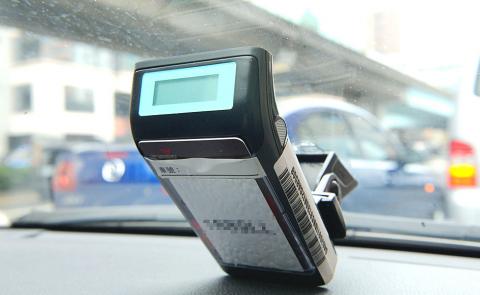Lawmakers from the legislature’s Transportation Committee yesterday questioned plans by the Ministry of Transportation and Communications to force motorists to install expensive on-board units (OBU) in preparation for freeway toll stations charging drivers by the number of kilometers they travel in 2012.
National Freeway Bureau -director-general Tseng Dar-jen (曾大仁) said the bureau recently coducted research on the policy change, during which experts simulated different toll-collecting methods and rates, in an effort to determine how the two factors affected traffic volume.
The bureau would have to analyze the results and then engage the public in dialogue on the different rate plans, adding that it had yet to finalize any plan, he said.

PHOTO: CNA
Although lawmakers were scheduled to review the budget for the National Freeway Construction and Management Fund for the next fiscal year, issues surrounding the freeway electronic toll--collecting (ETC) system quickly became the focus of a question-and-answer session at the committee.
At present, national freeway users have to pay toll fees whenever they drive through tollgates. Other than the ETC system, which requires motorists to install OBUs, motorists can pay toll fees by buying prepaid tickets.
However, the bureau is planning to change the toll-collecting method by charging users according to the distance they travel on freeways to ensure the fair use of the roads by all motorists.
The new policy would require that the great majority of users install OBUs in their vehicles.
As part of an attempt to increase installation and usage rates, Far Eastern Electronic Toll Collection Co (FETC), the contractor entrusted with the task of managing the ETC system, launched a one-year plan this month allowing motorists who have yet to install OBUs to try out the ETC system on a trial basis.
To participate in the trial, motorists must first open an account with FETC and deposit between NT$300 and NT$500. Through an image-recognition system that reads a vehicle’s license plate number, the FETC can deduct the money in the account whenever a vehicle drives through an ETC-only tollgate.
Lawmakers, however, questioned the viability of the bureau’s proposed change in the toll--collecting policy. They were also unhappy with the FETC’s plan to raise usage rates.
“If the FETC can collect toll fees through the image-recognition system, then that means you do not need an OBU to go on the freeways,” Democratic Progressive Party (DPP) Legislator Wang Sing-nan (王幸男) said, adding that the ministry should not be allowed to force motorists to install OBUs when the new toll-collecting policy takes effect.
One of the reasons why people don’t buy the OBU system is that it is considered expensive and individuals have to cover the cost of installation themselves.
DPP Legislator Yeh Yi-jin (葉宜津) and Chinese Nationalist Party (KMT) Legislator Yang Jen-fu (楊仁福) said those buying OBUs before the FETC announced its new plan were buying “a pig in a poke” because for the moment motorists did not need an OBU to drive through ETU-only toll gates.
Tseng, said the FETC’s plan was a short-term experiment not a long-term undertaking. The results of the trial period would be factored into the calculation of monthly OBU usage rate, which will be raised 42 percent by next month, he said.

An essay competition jointly organized by a local writing society and a publisher affiliated with the Chinese Communist Party (CCP) might have contravened the Act Governing Relations Between the People of the Taiwan Area and the Mainland Area (臺灣地區與大陸地區人民關係條例), the Mainland Affairs Council (MAC) said on Thursday. “In this case, the partner organization is clearly an agency under the CCP’s Fujian Provincial Committee,” MAC Deputy Minister and spokesperson Liang Wen-chieh (梁文傑) said at a news briefing in Taipei. “It also involves bringing Taiwanese students to China with all-expenses-paid arrangements to attend award ceremonies and camps,” Liang said. Those two “characteristics” are typically sufficient

A magnitude 5.9 earthquake that struck about 33km off the coast of Hualien City was the "main shock" in a series of quakes in the area, with aftershocks expected over the next three days, the Central Weather Administration (CWA) said yesterday. Prior to the magnitude 5.9 quake shaking most of Taiwan at 6:53pm yesterday, six other earthquakes stronger than a magnitude of 4, starting with a magnitude 5.5 quake at 6:09pm, occurred in the area. CWA Seismological Center Director Wu Chien-fu (吳健富) confirmed that the quakes were all part of the same series and that the magnitude 5.5 temblor was

The brilliant blue waters, thick foliage and bucolic atmosphere on this seemingly idyllic archipelago deep in the Pacific Ocean belie the key role it now plays in a titanic geopolitical struggle. Palau is again on the front line as China, and the US and its allies prepare their forces in an intensifying contest for control over the Asia-Pacific region. The democratic nation of just 17,000 people hosts US-controlled airstrips and soon-to-be-completed radar installations that the US military describes as “critical” to monitoring vast swathes of water and airspace. It is also a key piece of the second island chain, a string of

The Central Weather Administration has issued a heat alert for southeastern Taiwan, warning of temperatures as high as 36°C today, while alerting some coastal areas of strong winds later in the day. Kaohsiung’s Neimen District (內門) and Pingtung County’s Neipu Township (內埔) are under an orange heat alert, which warns of temperatures as high as 36°C for three consecutive days, the CWA said, citing southwest winds. The heat would also extend to Tainan’s Nansi (楠西) and Yujing (玉井) districts, as well as Pingtung’s Gaoshu (高樹), Yanpu (鹽埔) and Majia (瑪家) townships, it said, forecasting highs of up to 36°C in those areas